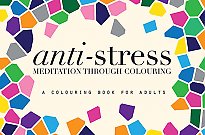
Meditation: the ultimate stress balancer

Inner happiness, outer beauty
Most people are like out-of-tune musical instruments,” says Swami Kriyananda, yoga and meditation guru and author of Meditation for Starters.
“Because they can no longer hear the basic notes in themselves, their interactions with life and with other people produce only discords.”
“Meditation is the way to ‘fine-tune’ your instrument. A violinist, while tuning his strings, must listen carefully to certain keynotes. We, too, must listen to what life is trying to tell us – through outer circumstances and other people, as well as through the whispers of superconsciousness.”
Your finely tuned brain leads to a finely tuned body, counteracting the stress chemicals and hormones and resulting in both inner and outer happiness. This in turn is radiated in your appearance, to the point where it can even have a positive effect on those around you.
“During meditation, blood flow and metabolism are increased in areas of the brain that are known to be associated with feelings of happiness and wellbeing, such as the prefrontal cortex and the limbic system,” says Dr Gabriel Weiss, medical practitioner and author of The Healing Power of Meditation.
“This phenomenon is partly mediated by the neurons releasing a neurotransmitter called dopamine, which has been correlated with a feeling of happiness.
“Healthy emotional responses to meditation, such as happiness, are self-reinforcing in that the more time we spend dwelling in happiness, the more we are ‘wired’ to achieve the state of happiness.”
Letting it all go
One aspect that is common to most schools of meditation – and there are many – which arguably provides much of the benefit, is breathing. Yes, we all know how to do it in a basic sense, but the more rushed and stressed we become, the quicker and shallower the breath becomes. Breathing slowly and deeply has been shown to enhance numerous aspects of health.
“Deep breathing produces improvement in the quality of the blood due to increased oxygenation,” says Dr Paul Galbraith, author of Reversing Ageing. “Increased oxygenation of the blood aids the elimination of toxins from the system.
“The movements of the diaphragm during deep breathing exercises massage the abdominal organs – the stomach, small intestine, liver and pancreas. The upper movement of the diaphragm also massages the heart. This stimulates the blood circulation in these organs. The lungs become healthy and powerful, a good insurance against respiratory problems. The skin becomes smoother and a reduction of facial wrinkles occurs.”
You might like Meditation: a simple way to detox your mind


